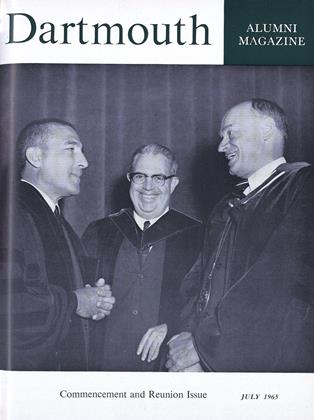As we, the Class of 1965, gather here this morning, mixed thoughts pass through our minds. We are happy to have completed four years of academic endeavor and other sundry pursuits, eager and expectant for what lies ahead of us; but at the same time there is an element of regret, of melancholy, of pathos in leaving the College, and the town. These past four years will prove to be one of the most meaningful periods of our lives.
"Your business here is learning" we were told at the beginning of freshman year by a certain personage on this platform. This learning has consisted of not just 37 courses and a pile of books, but has included all aspects of living, producing in the end the phenomenon known as the Dartmouth Man. Four years in Hanover have produced a strange mixture of intellectual and non-intellectual tendencies in him. Pervading everything about him is an air of informality, of casualness, of what has been called a "calculated indifference." Coupled with this are a directness and an openness of character that are somehow very refreshing in the world today; there is little of the intellectual haughtiness of Cambridge or New Haven.
This is not to say that the Dartmouth Man developed in the past four years is an anti-intellectual boor, isolating himself from the world and its problems. Beneath the indifferent facade that has indeed been called anti-intellectual by some, there lies the ability and the motivation to become involved in the important issues around him. The "calculated indifference" often serves as a way in which to observe the world seriously, objectively, and rationally before the mind is clouded by emotional haze. Our four years at Dartmouth, then, have instilled in us a deep involvement in intellectual pursuits paralleled by a similar involvement in the other finer pleasures of life. Though it might seem that one overshadows the other, both are very definitely and inalterably present.
Overriding all this is the emotional attachment to Dartmouth College shared by all of us - that subtle sense of pride, belonging, or whatever that is called "Dartmouth spirit." Whether or not this is brought about by the all-male situation, and whether or not there is a "new Dartmouth man" emerging, there is something about this spirit that makes it age-less among countless generations of Dartmouth men. It is interesting to note on the side that among alumni as well as undergraduates some of the most vehement and vociferous responses come as a result of College matters.
Here, at the end of our undergraduate years at Dartmouth, we go out into the world with an excellent education, the easy air of informality that is something different, something singular in this tense, fast-moving world, as well as a liking for and deep involvement in all aspects of life - intellectual and social, work and play. All this, plus the intangible commodity, Dartmouth spirit, make us straighten up, lift our heads, and say with pride, "I am a Dartmouth man."
In closing, then, let us keep in mind a word which, though its source might be controversial, does much in summing up our four years at Dartmouth and could serve as a watchword for the future a word that in Latin means onward and upward to better things I leave you with "Excelsior."
Richard E. Jones '65 of Rochester, N. Y..delivering 1965's farewell address.
 View Full Issue
View Full Issue
More From This Issue
-
 Feature
FeatureThe Quest for Quality
July 1965 By STEWART LEE UDALL, LL.D. '65 -
 Feature
FeatureSidney Chandler Hayward '26
July 1965 -
 Feature
FeatureChange and Challenge
July 1965 By HAROLD KING DAVISON '15 -
 Feature
FeatureTucker Heads Alumni Council
July 1965 -
 Feature
FeatureAlumni Awards
July 1965 -
 Feature
FeatureHONORARY DEGREE CITATIONS
July 1965
Features
-
 Feature
FeatureHow to Come Back
SEPTEMBER 1988 -
 Cover Story
Cover StoryQuite Good
MARCH 1995 By Abner Oakes IV '81 -
 Feature
FeatureAUTOMATION: Progress vs. Problem
APRIL 1963 By CLYDE E. DANKERT. -
 Feature
FeatureMen and Women: What's the Difference?
OCT. 1977 By Dan Nelson, Shelby Grantham -
 Feature
FeatureCommencement
June 1975 By JAMES L. FARLEY '42 -
 Feature
FeatureThe Shooter
Jan/Feb 2013 By Svati Kirsten Narula ’13


